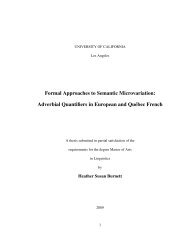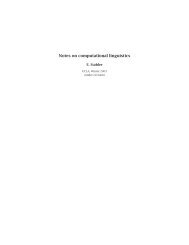Post Verbal Subjects and Agreement in Brazilian Portuguese
Post Verbal Subjects and Agreement in Brazilian Portuguese
Post Verbal Subjects and Agreement in Brazilian Portuguese
You also want an ePaper? Increase the reach of your titles
YUMPU automatically turns print PDFs into web optimized ePapers that Google loves.
clausal expletive pro-it to spec-TP (as it was proposed for VS unaccusatives with<br />
third s<strong>in</strong>gular verb agreement). This would then be followed by hang<strong>in</strong>g of todos os<br />
problemas to pro-il. It would then be <strong>in</strong>correctly predicted that (90) should allow<br />
for third s<strong>in</strong>gular agreement.<br />
I propose that it is the last step, topic hang<strong>in</strong>g itself, which rules out the<br />
undesired agreement <strong>in</strong> (90). As noted above, hang<strong>in</strong>g topics are <strong>in</strong>terpreted as<br />
hav<strong>in</strong>g the same function <strong>in</strong> the clause as the subject <strong>in</strong> spec-TP. However, note that<br />
we are assum<strong>in</strong>g that pro-il is a clausal expletive. The sentence is not possible<br />
because it would have a predicate hang<strong>in</strong>g off a clausal pro-form (rather than a<br />
predicate pro-form). By the same token, a DP <strong>in</strong>tended to be the subject cannot be<br />
hung of pro-il, but it can hang of the appropriate referential pronoun:<br />
(91) As men<strong>in</strong>as foram/*foi todos os problemas.<br />
The girls were/ was all the problems<br />
‘The girls were all the problem.’<br />
(92) As men<strong>in</strong>as, elas foram todos os problemas.<br />
The girls, they were all the problems<br />
‘The girls were all the problems.’<br />
Thus, rais<strong>in</strong>g a clausal expletive <strong>and</strong> leav<strong>in</strong>g both the subject <strong>and</strong> the subject<br />
of the small clause vP <strong>in</strong>ternally is also ruled out for hang<strong>in</strong>g topic copulars. 28<br />
28 The same reason<strong>in</strong>g also rules out the possibility of a hang<strong>in</strong>g topic lead<strong>in</strong>g to agreement<br />
mismatches such as (i) <strong>in</strong> unaccusatives:<br />
(i) As men<strong>in</strong>as chegou.<br />
The girls arrived.sg<br />
‘The girls arrived.’<br />
34

















